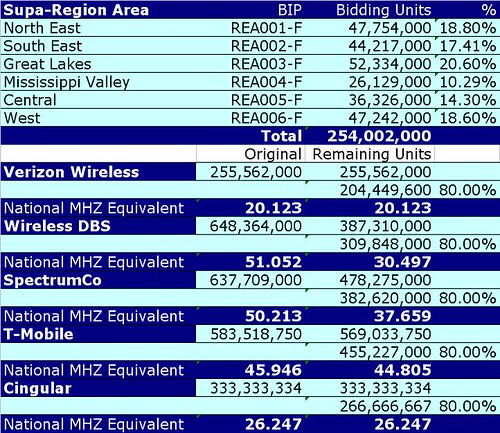AWS-1 Auction - Bidding Units
The following graphic explains the mechanics of the Auction Rules and why some parties are bidding on a lot of licenses and others seem to bidding hardly at all. Furthermore, it explains why the amounts reported as "Provisionally Winning Bids" are also meaningless. The bidding units themselves are proportional to the population of the region: smaller regions have smaller amounts, for instance CMA547 only requires 8,000 bidding units. 20MHz of mainland USA is equivalent to 254,002,000 (or roughly the population at the time of the 2000 census)
Each party started off with an original amount of bidding units and paid a proportional deposit. So Verizon Wireless elected to start the auction with 255,262,000 bidding units - just enough for a nationwide 20MHz license. Wireless DBS elected to start off with enough for the equivalent of a nationwide license covering an incredible 51MHz! Even accounting for the fact they need Alaska and Hawaii as well as mainland USA, 648,364,000 seems a little excessive to me.

At this stage of the auction, everyone has to bid at least 80% of the remaining units or else the bidding units are gradually reduced in proportional to amount of activity and therefore these parties can only bid for less spectrumin subsequent rounds. If you have a license in the previous round this counts in your bidding units.
It seems apparent to me that Verizon Wireless wants a 20MHz nationwide license and is bidding accordingly. Because of the 80% rule, they do not have to bid on every one of the supa-regions in every round and keep the ability to bid on everything, but they must bid on the biggest region, the Great Lakes, because that accounts for more than 20% of the total. Verizon Wireless have no interest to speed up the auction, so don’t have to bid on the most expensive license. This seems to be the real reason for behaviour last week - I have to admit it looks like I was completely wrong on Friday. In Round 9, when SpectrumCo raised the ante on the West supa-license to £442m, Verizon immediately stopped bidding on this license to allow the other regions to catch-up. Perhaps Verizon Wireless will swap to bidding on Bands D&E (in total 20MHz) when the differential between D+E compared to F gets too great.
The real reason that there so much life in the auction at the moment and the reason that the money is shooting up so quickly is because the Top 5 companies in the list are still bidding on 160MHz when in total there is only 90MHz on offer. And this is before the "majors" start bidding on the "minor" licenses…
Each party started off with an original amount of bidding units and paid a proportional deposit. So Verizon Wireless elected to start the auction with 255,262,000 bidding units - just enough for a nationwide 20MHz license. Wireless DBS elected to start off with enough for the equivalent of a nationwide license covering an incredible 51MHz! Even accounting for the fact they need Alaska and Hawaii as well as mainland USA, 648,364,000 seems a little excessive to me.

At this stage of the auction, everyone has to bid at least 80% of the remaining units or else the bidding units are gradually reduced in proportional to amount of activity and therefore these parties can only bid for less spectrumin subsequent rounds. If you have a license in the previous round this counts in your bidding units.
It seems apparent to me that Verizon Wireless wants a 20MHz nationwide license and is bidding accordingly. Because of the 80% rule, they do not have to bid on every one of the supa-regions in every round and keep the ability to bid on everything, but they must bid on the biggest region, the Great Lakes, because that accounts for more than 20% of the total. Verizon Wireless have no interest to speed up the auction, so don’t have to bid on the most expensive license. This seems to be the real reason for behaviour last week - I have to admit it looks like I was completely wrong on Friday. In Round 9, when SpectrumCo raised the ante on the West supa-license to £442m, Verizon immediately stopped bidding on this license to allow the other regions to catch-up. Perhaps Verizon Wireless will swap to bidding on Bands D&E (in total 20MHz) when the differential between D+E compared to F gets too great.
The real reason that there so much life in the auction at the moment and the reason that the money is shooting up so quickly is because the Top 5 companies in the list are still bidding on 160MHz when in total there is only 90MHz on offer. And this is before the "majors" start bidding on the "minor" licenses…




<< Home